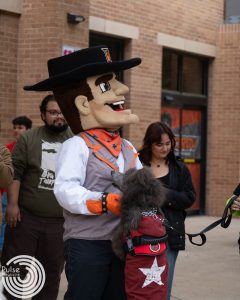Transcending Societal Norms: Transgender in the Valley
Transgender in the valley
“I used to hate that I felt this way or I used to hate that I couldn’t fit in,” said Valerie Cantu, a transgender woman. “I hated that I wanted to to be a girl or that I liked feminine things; I saw how other boys acted or talked, and it felt unnatural to me.”
Cantu just recently discovered after years of depression and torment that it’s okay to be who she is. Throughout the course of Cantu’s life she’s experienced and interacted with people who have assumed she knows exactly who she is without thinking about the possibility of the internal battle Cantu faces with her gender identity.
“For about nine years I just kept it all inside and it resulted in further depression, anger, and suicidal thoughts,” Cantu said.
From the day of transgender individuals’ births they are thrown into a gender that doesn’t represent who they are or who they want to be. Who knew that pronouns like “he” or “she” had the potential to make a person think so negatively that they’d consider suicide? The meaning attached to these pronouns isn’t something we think about in our daily lives, but that isn’t the case for those who are constantly fighting their inner feelings about who they feel they deserve to be.
“I first identified as being a crossdresser because it made sense to me at the time,” said Cantu. “Liking makeup and women’s’ clothing but it didn’t feel right because it felt like I was wearing a costume.”
In Cantu’s case she was in constant battle with herself when it pertained to her gender identity and biological sex. Cantu didn’t realize she was a person who identified as transgender and was not able to find the label she fit under.
“Growing up in the early 90’s I never really heard that word before,” the 28-year-old said. “I heard drag queen and crossdresser because of Jerry Springer but never the actual word transgender.”
It’s understandable that words such as crossdresser, drag queen and transgender can be confusing especially to those who are trying to figure out who they are. Growing up we heard the terms gay and lesbian and saw the acronym LGBT, but with each generation, there seems to be more to understand about gender identity.
“I remember around 2009/2010 doing a google search because the word transgender was coming up a lot more and the first thing that came up was nothing but porn,” said Cantu. “I got scared and shut off my computer and it wasn’t until 2013 that I started seeing a counselor for not just my anger issues but also my gender dysphoria.”
People diagnosed with gender dysphoria are in constant battle with the sex they were born in and the gender they identify with. Coming out as someone who is transgender can be an especially scary process when coming from an area influenced by Latino culture such as the Valley. They are faced with the “machismo” mindset and the Catholic religion in addition to a very strong sense of family.
“Machismo is the idea that men are held in a position of superiority in all ways. That women are to serve them and their needs before their own needs,” said Victoria Garza, a gender equality activist. “Mexican/Mexican-American culture is pretty machista and it’s just not men who holds these ideas.”
Keeping the pride that comes with the blood Cantu was born with can be difficult when identifying as trans. Cantu found herself having to live two separate lives due to fears of what could happen when she finally does come out.
“It’s still hard having that balance between a double life until I can fully come out to everybody,” said Cantu.
Finding support and others who can relate to Cantu’s situation can be exponentially difficult, especially when it pertains to something as controversial as being transgender. The Valley can be behind at times, so Sabastian Bryan Anaya found himself pondering where he’d able to find answers to his questions. For people like Anaya, a female to male transgender person, this was especially true when looking for resources to begin transitioning.
“It was kinda like a maze for me and a lot of other people. I know personally if my life wouldn’t have been so public I know of two or three guys who wouldn’t be starting their transition,” Anaya said. “So I made it a point to make this aspect of my life public because that moment that I felt so alone not knowing who to go to I don’t want anyone else to go through that.”
Being so close to the border most individuals who identify as transgender look for other resources and healthcare treatments on the other side. Many trans individuals here in the Valley consider hormonal treatment across the border for the mere fact of how easily accessible and cheap it is despite the dangers and health risks that come with improper administration.
Dr. Michelle Cordoba Kissee, a endocrinologist in Edinburg states the potential hazards of what counterfeit hormonal injections can do to a patient.
“If it’s something that they want to do by changing their hormonal replacement it’s best to do it safely. The risks are just like any hormones usually related to the risks of blood clots we can also have the risks regarding liver function,” Dr. Cordoba said. “Those are all things we monitor pretty frequently. They’re basic tests and easy to do and the good thing is if there’s a problem then we can adjust the hormonal replacement accordingly.”
Stories have surfaced about incidents occurring when individuals self inject without the knowledge of what makes up the composition of these treatments. Anaya heard from another trans individual of what these treatments can consist of.
“One of my friends said that she was injecting her breasts with silicone that ended up being platelets to what they use to make concrete,” Anaya said. “So I recommended her to Dr. Cordoba and said she would make it a point to talk to her about that because she didn’t know if later on if it’s going to affect her in a negative way when she gets her implants.”
Transgender is a term that’s not commonly heard in the medical field so they encounter discrimination not just from the outside world but also in a place where Anaya and Cantu are supposed to find compassion and an understanding of who they are. There have been incidents not just in the Valley but elsewhere around the world involving cases where transgender people have either been mocked or in worst-case scenario been rejected medical treatment.
“The previous doctor I was seeing I wouldn’t of dared say I was trans because of his background,” Cantu said. “It wouldn’t of gone very well and he would of ended me as a patient.”
When a loss of trust towards medical professionals occur transgender individuals can’t help but wonder, why situations like these happen.
“It’s definitely a lack of education so most of us going through medical school will have little to no education on trans health issues,” Cordoba Kissee said. “Physicians are always under so much pressure to learn so many new things that our response a lot of times if it’s not something we’re familiar with is to say, well that’s not my problem and I think the judgemental part can be a little bit of fear.”
It isn’t just the medical field that many transgender individuals fear but also the workplace environment.
“Employers can fire people in many states for openly being LGBT or deny applications,” Cantu said. “There’s also an issue where landlords can evict anyone since there are no discrimination protections for sexual orientation. So we’re stuck in an endless cycle of being in fear of unemployment and/or kicked out of our homes which often leads LGBT people to poverty.”
Anaya and Cantu haven’t been alone with these challenges. In fact they’ve both had the support of their wives and, in Cantu’s case, support from her 6-year-old son.
“I asked my son if I became a girl would he still love me and he answered very seriously with his eyes really big ‘of course!’ but that he would have a lot of questions,” Cantu said. “He still calls me dad and I will never tell him that he has to call me anything different, but it gives me anxiety thinking about what could happen one day when I’m out in public with him and I’ve gone through the transition. What do I do when he calls me dad?”
Christine Severn, Cantu’s wife, shares her perspective on the process of Cantu’s transitioning and its affect on their family life.
“There’s always fear for all of us about what could happen, but we’ve taught our son that everyone is different,” Severn said. “It’s been interesting learning about what comes with transitioning and what comes with being LGBT, but I know it’s going to be difficult sometimes.”
28-year-old Linda San Miguel, Anaya’s wife, has always known of his transition and the story behind who he is since the first day they’ve met. She’s seen the struggles of being a transgender person and knows how he feels when he’s misgendered.
“When we first started dating I never called Sabastian by his birth name. I’ve always called him by his preferred pronouns, but with my family it’s been taking time for them to use proper pronouns,” San Miguel said. “When they do call him ‘she’ I can notice how much it hurts him and to see that hurts me.”
Anaya shares his experience with being misgendered and what he feels when it occurs.
“For me I get really sad because I feel they are ripping away a victory that’s taken my whole life to achieve,” Anaya said. “I finally won the battle against my inner demons so to be misgendered makes me feel I haven’t conquered or won this fight.”
To be misgendered can be a difficult situation to be in especially when documentation similar to driver licenses and birth certificates show the wrong gender marker that you identify with. Cantu shares her perspective on why it seems to be difficult for transgender individuals to change the gender markers on their documentation.
“There are fees that we do have to pay for but it can be expensive for a person who is unemployed and trying to change their name,” Cantu said. “Unemployment is a huge issue for LGBTQ people but especially for transgender people who need to change their identification. If unemployment for trans people is twice as much as the national average of unemployment than there’s something wrong.”
Many people in the LGBTQ community have experienced the feelings and conflict of coming out to family members. For most there is a fear of becoming hated or even disowned. Their true identities end up bottled up. For Anaya and Cantu they’ve both shared their feelings and thoughts about coming out.
“She raised us to be men and that was always my mom’s mentality, so when I do come out to her I just hope that she can still love me and accept me,” Cantu said.
Anaya’s coming out to his family wasn’t as nerve-wracking as he expected because of the close bond he has with his family.
“When I first came out to my family it wasn’t a huge surprise to anyone,” Anaya said. “In actuality my brother didn’t allow me to finish my sentence before he said he always knew. I told all of my family before I told my father but the second I did come out to him as trans he immediately said that he wouldn’t allow me to go to Mexico to receive hormonal treatment.”
Though they have common experiences with coming out, there are still people within the LGBT spectrum that discriminate against people who identify as transgender. Cantu has witnessed what people who are part of the community say when talking about transgender individuals.
“I’ve seen negative comments or jokes made by gays and lesbians towards trans people. There’s been a history of that discrimination going back to Stonewall,” Cantu said. “Authors have written out trans woman from the early narratives of Stonewall. They’ve written out Marsha P. Johnson and Sylvia Rivera who did amazing work for the trans community. In fact Sylvia Rivera in the early 70’s helped to organize the first pride marches in New York City and after a while they told her that they didn’t want her there.”
Patience, liberation, and satisfaction are words used to describe the experiences that San Miguel, Anaya and Cordoba have gained when being involved with the trans community.
‘Vale’ a latin word that Cantu became familiar with in her studies is the latin derivative of her name Valarie. The meaning behind Valarie,‘to be strong’, helped pave the way through her journey as a trans woman.
“If I could go back to see preteen me, 18-year-old me or even me four years ago I would say it’s okay to be different. I used to cry myself to sleep in hopes that I’d wake up normal whether it was without diabetes, or feeling suicidal or without feeling that I’m supposed to be a girl,” Cantu said. “Now I realize I am normal and that there was never anything wrong with me. That it is okay to like different things, to feel this way, and that you don’t have to feel ashamed for being different.”








